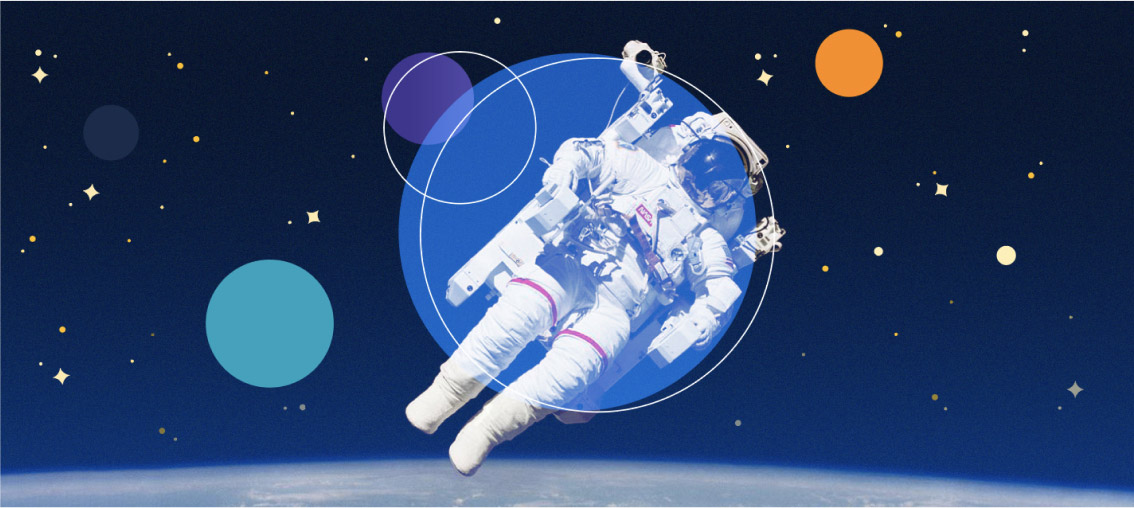“Frankly, our fiber options were pretty depressing.” An interview with astronaut Mike Dexter
As Atlassian Space Service’s inaugural mission reaches orbit, we wanted to get a sense of what awaits Atlassian Cloud Support Manager Charlie Ecaps during his week in space. We asked Astronaut Mike Dexter, a former resident of the International Space Station (ISS), to share his perspective on remote teamwork, work-life balance in zero gravity, and how space travel has shifted his perspective on what’s important.
Q: The first question is one you probably get asked a lot: what’s it like in space?
A: It’s definitely a question I get asked a lot. People who know me well usually say something like “What’s it like to be a space cadet?” … haha. But seriously, it’s a huge honor to be one of very few humans who’ve had the opportunity to travel out of the Earth’s atmosphere and experience the thrill of space exploration. I guess you could say it was an “out of this world” experience.
Q: When did you know you wanted to be an astronaut?
A: If you talk to people in the space program, you’d probably find that most of us showed an interest in space from a really young age. For me, I can remember sitting on the living room floor watching Saturday morning cartoons and seeing Daffy Duck as “Duck Dodgers” facing off with Marvin the Martian. Even though I knew that was pure fiction, it really ignited a sense of fascination for me. I wondered … is there life on other planets? If so, what does it look like? Is it friendly?
Q: And if martians exist, do they really wear skirts and tennis shoes?
A: [laughs] Exactly! Is there really a “space modulator” that could destroy Earth as we know it?
Q: Is there?
A: Well, that answer is definitely above your security clearance level. Let’s just say that if it exists, it doesn’t look like a little red stick of dynamite.
Q: Fair enough. So, Mike, as you know, Atlassian is all about unleashing the power of teams. Over the past year, we’ve been especially focused on remote teams. Do you think it’s fair to say that astronauts are the pioneers of remote teamwork?
A: Very much so. The space program requires tightly choreographed teamwork between Mission Control and the crew in orbit. The people on the ground are monitoring everything we do – and I do mean everything – to ensure the safety and security of everyone on board. They know what we eat, when we sleep, how often we use the restroom. For anyone who thinks that getting on a Zoom call from home is intrusive, it’s nothing compared to getting a message from a member of the med team telling you to increase your fiber intake. Frankly, our fiber options were pretty depressing.
Q: We’re sending the first Atlassian into space as we speak. One of our cloud support managers, Charlie Ecaps, will live and work in a space capsule for an entire week to help us test the boundaries of remote collaboration. What advice do you have for him?
A: I guess I would tell Charlie to go ahead and indulge in the deep contemplation that’s going to arise. Staring out the window at Earth gives you the chance to re-evaluate your life in a new way.
The world really does look pretty small from up there, but not as small as the crew lavatory – especially when you have to share it with someone like my crewmate Frank Rossitano. I’m pretty sure Frank could’ve won the award for “messiest guy in the solar system” … haha. When you’re in space, you have to secure every tiny thing or it will end up floating around the capsule. But we’re all human and, hey, sometimes those Earth habits creep in. Unfortunately, one day Frank forgot to secure one of the vials for his “sun tea” experiment and let’s just say it was a powerful reminder for everyone on board.
I’d also tell Charlie to not get freaked out the first time he opens a can of peanuts and it looks like the nuts are dancing. Remember, everything looks different in zero gravity. Also, tears don’t actually fall in space – they just ball up in your eyes and make it impossible to see – so it’s important to keep your wits about you.
Q: After living in space for six months it must be hard to return to everyday life. Was it hard to adjust to life on Earth after spending six months in orbit?
A: Definitely. There are multiple levels of adjustment. There’s the normal stuff, like getting used to gravity again. You can’t just let go of something and have it float in the air next to you. I can’t tell you how many bottles of Diet Snapple I dropped when I got home! My wife Liz was just about ready to kick me out.
But there’s also the emotional adjustment. You have to learn how to relate to the people in your life again. After looking out at the vastness of the infinite universe, it can be a challenge to remember that, yes, it’s important to sit on the couch with my wife and watch the “Below Deck” reunion on Bravo, even though it’s inevitably going to end up in a screaming match between cast members. I have to remember that not everyone has my elevated context on the meaning of life.
There’s a beauty in the simple pleasures, like sharing a block of Cracker Barrel Vermont Cheddar with the love of your life while she yells at Andy Cohen on the TV. If it’s important to her, it needs to be important to me. It’s not her fault she’s completely unaware of the potential existence of the Illudium Q-36 Explosive Space Modulator. So I try to keep it all in perspective. Life is a precious gift, you know?

